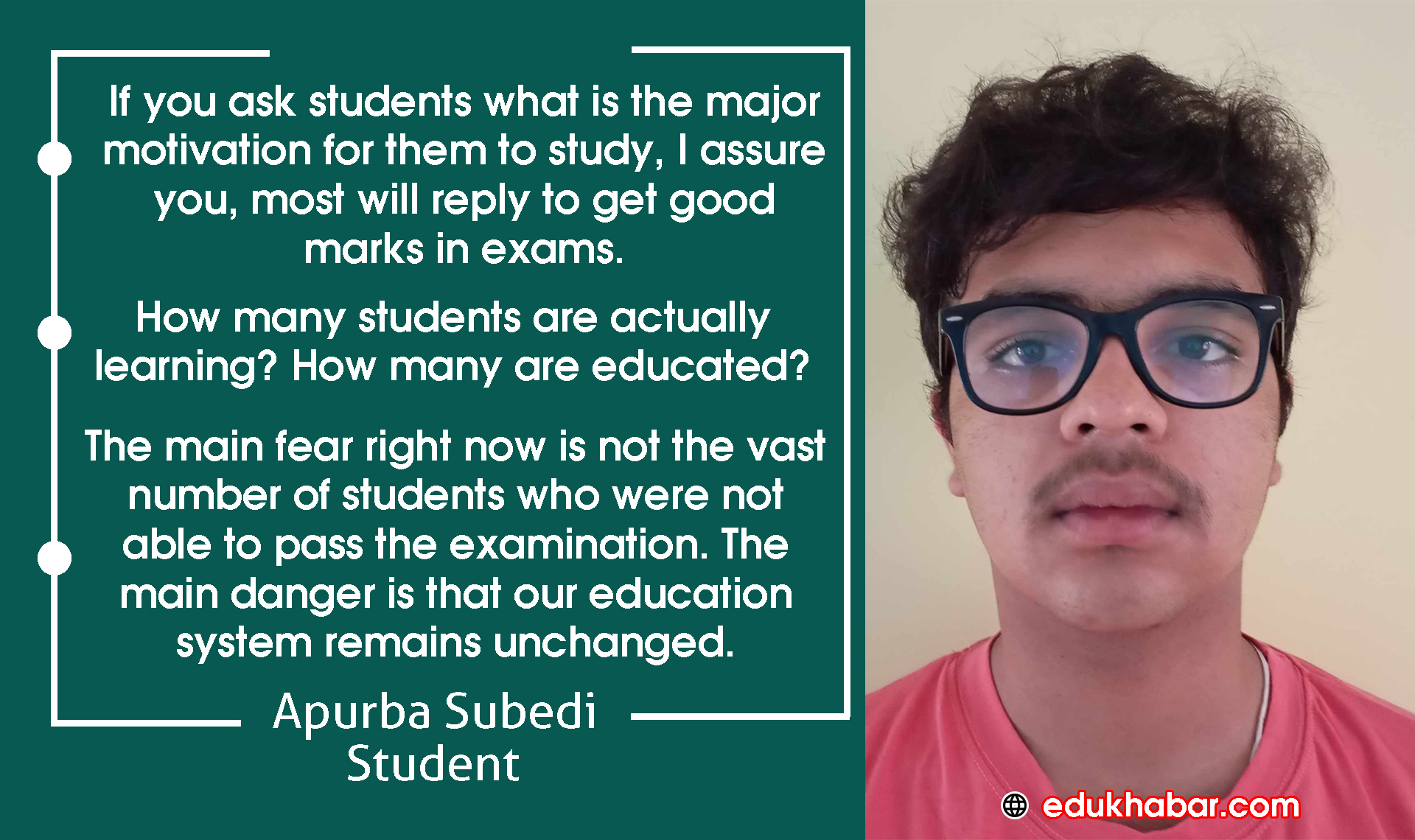
The recently published SEE results have sparked quite a discussion among the citizens of our country. After all only 47 percent of students appearing passed their SEE exams. The announcement has left many horrified and many more outraged. The majority of citizens-mostly parents-have denounced the teachers responsibility. However, in this hailstorm of disputes we all are forgetting a crucial fact: education is not reflected by mark sheet.
Albert Einstein in his address to State University of New York on the occasion of celebration of tercentenary of higher Education said: ‘’The wit was not wrong who defined education in this way: ‘Education is that which remains, if one has forgotten everything he learned in school.’ He describes education as the change that is instilled in people after learning. The purpose of education is to learn new things and skills. It is to give people the ability to think and express their thoughts. It is to change people to become more adept, civilized and ethical. In our country, however, how many students are actually learning?
When I try to remember myself what was taught in my grade 10 all I can remember is studying hard (not very hard) for the SEE examination. I also clearly remember the obsessions I had then; to get good grades. Which I realize was very wrong. And I think this is the very obsession that has led our education system to astray: getting good marks in examination.
How many students are actually learning? How many are educated? The answer to this question is not 47 percentages. The true number is very, very low.
If you ask students what is the major motivation for them to study, I assure you, most will reply to get good marks in exams. It is true that getting good marks is important; it shows the competence of individuals compared to other students. The current infatuation for good marks, however, is not a competition: it is maniacal.
Students no longer visit their class everyday with the aim to learn new things. They go to classes in order to memorize the answers to questions that will appear in their examination. Teacher no longer aim to bring a change in their students so that they will become competent; they make students mug up for exams so that they can show off the good grades. Schools do not aim to instill education in students; they want their students to generate a good mark sheet so they can advertise themselves. Parents also judge their children's competence through mark sheets. And the government only focuses on how many students passed the examinations rather than how many educated workforce it has produced. This obsession after marks has made us lose sight of the fundamental purpose of education. It is destroying our education.
How many students are actually learning? How many are educated? The answer to this question is not 47 percentages. The true number is very, very low.
In fact, the answer is right before us. The political instability in our country because of the elected leaders cannot stay two years in government. Poor administration process by government staffs, Corruption prevalent in offices, the economy that is hanging by a spider web. The current trajectory of country clearly shows how many educated citizens our education system was able to produce.
For business men education has always been one of the most profitable commodities. In the name of quality education they have charged excessive fees.
A country with proper education system should have the ability to change students to become honest and ethical. As a part of social studies class students are taught about corruption. Its bad impacts and how it is prevalent in Nepalese society. Proper education should have been able to influence those students to never commit such immoral and illegal acts. But the same students later go on to become officers and high post employee that are involved in corruption. The same is true for politicians. Proper education should have been able to shape them into leaders not power seekers. A country with a good education system would have never fallen into a drastic condition like ours.
Where exactly did we go wrong? It is a difficult question to answer. Long in the past when students went to Gurukuls to study the philosophy of instilling change was intact. But somewhere the education system started to become astray. One of the major contributors for sure, is the commercialization of education. For business men education has always been one of the most profitable commodities. In the name of quality education they have charged excessive fees. To increase their sales, that is to get more students enrolled; they play political games so that the public schools' quality degraded.
Therefore, the main fear right now is not the vast number of students who were not able to pass the examination. The main danger is that our education system remains unchanged. The attraction towards producing good grades is presented stronger than ever and business men are still in action in background producing sales while restricting the growth of public schools. So, the majority of future citizens are just perfect grade producers that lack the ability to develop the country. The future of a developed country that we hope for is grim.
The only way we can bring about the change to take action immediately. Instead of playing political games for power, the government should focus more on the basics and build a good education system. We citizens should be able to raise our concern, if we ever want to envision a better future for our country.
प्रतिक्रिया